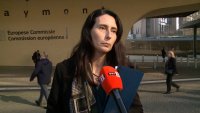
Even in the uncertain context of the Russian war in Ukraine, Bulgarians continue to see European countries as their closest international partners. At the same time, there is a widespread perception in Bulgaria of rising prices in recent weeks.
Regarding wildfires, Bulgarian society appears to be primarily self-critical when it comes to causes and responsibility.
These findings come from a survey on some of the current seasonal topics, conducted as part of the independent “Face to Face” research programme by the polling agency “Myara.”

President Trump's meetings with Putin, Zelensky and European leaders come against a backdrop of traditional Bulgarian respect for European powers and a more hesitant attitude towards Russia and the United States. This long-observed Bulgarian tendency is reflected in the data: 64.9% of Bulgarians have a positive view of the European Union, with 21.3% holding a negative view. Germany shows similar figures, with 61.2% positive versus 25.2% negative. France registers 54.1% positive and 28.9% negative. Even the United Kingdom, despite leaving the EU, receives a relatively positive assessment: 51.3% positive versus 31.2% negative. NATO is viewed positively by 38.7% and negatively by 41.9%. The United States and Russia have ratings of 32.5% positive versus 49.6% negative, and 31.2% positive versus 49.7% negative, respectively. Ukraine itself is seen positively by 24.7% of Bulgarians and negatively by 55.1%.

It is clear that Bulgarian opinion still favours a general image of Europe, which remains closest even in uncertain circumstances. Ukraine, in contrast, is perceived as a “collateral victim” of international conflicts, with relatively low positive approval similar to attitudes toward Russia, which have declined since the start of the Russian invasion. The current image of the United States appears to polarise opinions in Bulgaria.
Meanwhile, nearly three-quarters of adult Bulgarians believe that prices for goods and services have risen in recent weeks. Only 2% report a decrease, 17.3% say there has been no change, and 73.9% indicate they have noticed an increase. Around 7% are unsure.

Although some of this may reflect habitual pessimism, the figures are substantial, particularly among older citizens, and remain significant even among supporters of the current governing parties.
During the wildfire season, 63% of adult Bulgarians express a positive view of the work of the fire services, while 21.2% hold a negative view. The remainder are undecided. This represents a clearly positive assessment of public trust in firefighters.
However, when asked in an experimental indicator to take a position between two interpretations of the situation in Bulgaria, most adults remain critical of the institutions responsible for addressing the fires. 31.9% chose: “Institutions in Bulgaria are doing as much as possible, although the situation is clearly difficult.” By contrast, 57.3% preferred: “The situation is clearly difficult, but institutions in Bulgaria are not doing as much as they could.” Just over 10% could not decide.

When asked to select up to three main factors contributing to the wildfire situation, 87.8% cited human negligence, 84.6% pointed to deliberate arson, 68.3% mentioned natural causes such as heat and wind, and 45.5% cited insufficient care by responsible institutions. This shows that alongside high expectations of institutions, society also demonstrates a pronounced self-critical response.

In conclusion, at a human and principled level, firefighters naturally earn public approval. Traditional scepticism remains towards the overall performance of authorities. In the wildfire season, public self-blame is particularly evident. Trust in firefighting work is high, expectations of institutions are high, but Bulgarians perceive that their own negligence or malice as members of society has been the decisive factor in the severity of the fires, rather than institutional weaknesses.
The data come from the independent research programme of the sociological agency “Myara.”
The survey was conducted face-to-face using tablets between 31 July and 8 August 2025, with a sample of 801 adult Bulgarian citizens. The maximum standard deviation is ±3.5% at 50% shares. One percent of the sample represents approximately 54,000 people.
 Economy Minister Orders On-Site Checks at Electricity Suppliers Following Surge in Complaints
Economy Minister Orders On-Site Checks at Electricity Suppliers Following Surge in Complaints
 Sunken Fishing Vessel off Sozopol Shows No Breaches or Holes in the Hull, Navy Chief Says
Sunken Fishing Vessel off Sozopol Shows No Breaches or Holes in the Hull, Navy Chief Says
 Депутатите отложиха въвеждането на мултифондовете в пенсионната система
Депутатите отложиха въвеждането на мултифондовете в пенсионната система
 Казусът с българския европрокурор: Какви са обвиненията срещу Теодора Георгиева?
Казусът с българския европрокурор: Какви са обвиненията срещу Теодора Георгиева?
 България не е усвоила нито едно от 600 000 000 евро от фонда за справедлив преход, заяви служебният регионален министър
България не е усвоила нито едно от 600 000 000 евро от фонда за справедлив преход, заяви служебният регионален министър